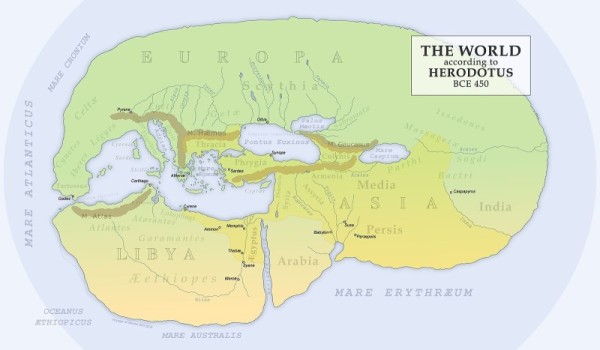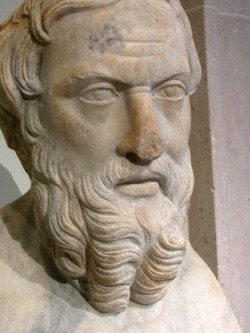After this Cambyses planned three several expeditions, one against the Carthaginians, another against the Ammonians, and a third against the “Long-lived” Ethiopians . . . .

Translated by George C. Macaulay — our special project presenting the complete Herodotus with URLs for all of those people, places, events, and things which baffles and discourages modern readers.
Previously on Herodotus
16. From Memphis Cambyses came to the city of Sais with the purpose of doing that which in fact he did: for when he had entered into the palace of Amasis, he forthwith gave command to bring the corpse of Amasis forth out of his burial-place; and when this had been accomplished, he gave command to scourge it and pluck out the hair and stab it, and to do to it dishonor in every possible way besides: and when they had done this too until they were wearied out, for the corpse being embalmed held out against the violence and did not fall to pieces in any part, Cambyses gave command to consume it with fire, enjoining thereby a thing which was not permitted by religion: for the Persians hold fire to be a god. To consume corpses with fire then is by no means according to the custom of either people, of the Persians for the reason which has been mentioned, since they say that it is not right to give the dead body of a man to a god; while the Egyptians have the belief established that fire is a living wild beast, and that it devours everything which it catches, and when it is satiated with the food it dies itself together with that which it devours: but it is by no means their custom to give the corpse of a man to wild beasts, for which reason they embalm it, that it may not be eaten by worms as it lies in the tomb. Thus then Cambyses was enjoining them to do that which is not permitted by the customs of either people. However, the Egyptians say that it was not Amasis who suffered this outrage, but another of the Egyptians who was of the same stature of body as Amasis; and that to him the Persians did outrage, thinking that they were doing it to Amasis: for they say that Amasis learnt from an Oracle that which was about to happen with regard to himself after his death; and accordingly, to avert the evil which threatened to come upon him, he buried the dead body of this man who was scourged within his own sepulchral chamber near the doors, and enjoined his son to lay his own body as much as possible in the inner recess of the chamber. These injunctions, said to have been given by Amasis with regard to his burial and with regard to the man mentioned, were not in my opinion really given at all, but I think that the Egyptians make pretence of it from pride and with no good ground.
17. After this Cambyses planned three several expeditions, one against the Carthaginians, another against the Ammonians, and a third against the “Long-lived” Ethiopians, who dwell in that part of Libya which is by the Southern Sea: and in forming these designs he resolved to send his naval force against the Carthaginians, and a body chosen from his land-army against the Ammonians; and to the Ethiopians to send spies first, both to see whether the table of the Sun existed really, which is said to exist among these Ethiopians, and in addition to this to spy out all else, but pretending to be bearers of gifts for their king.
18. Now the table of the Sun is said to be as follows:–there is a meadow in the suburb of their city full of flesh-meat boiled of all four-footed creatures; and in this, it is said, those of the citizens who are in authority at the time place the flesh by night, managing the matter carefully, and by day any man who wishes comes there and feasts himself; and the natives (it is reported) say that the earth of herself produces these things continually.

CC BY-SA 2.0 image from Wikipedia.
19. Of such nature is the so-called table of the Sun said to be. So when Cambyses had resolved to send the spies, forthwith he sent for those men of the Ichthyophagoi who understood the Ethiopian tongue, to come from the city of Elephantine: and while they were going to fetch these men, he gave command to the fleet to sail against Carthage: but the Phoenicians said that they would not do so, for they were bound not to do so by solemn vows, and they would not be acting piously if they made expedition against their own sons: and as the Phoenicians were not willing, the rest were rendered unequal to the attempt. Thus then the Carthaginians escaped being enslaved by the Persians; for Cambyses did not think it right to apply force to compel the Phoenicians, both because they had delivered themselves over to the Persians of their own accord and because the whole naval force was dependent upon the Phoenicians. Now the men of Cyprus also had delivered themselves over to the Persians, and were joining in the expedition against Egypt.
20. Then as soon as the Ichthyophagoi came to Cambyses from Elephantine, he sent them to the Ethiopians, enjoining them what they should say and giving them gifts to bear with them, that is to say a purple garment, and a collar of twisted gold with bracelets, and an alabaster box of perfumed ointment, and a jar of palm-wine. Now these Ethiopians to whom Cambyses was sending are said to be the tallest and the most beautiful of all men; and besides other customs which they are reported to have different from other men, there is especially this, it is said, with regard to their regal power,–whomsoever of the men of their nation they judge to be the tallest and to have strength in proportion to his stature, this man they appoint to reign over them.
– Herodotus, Book III
| <—Previous | Master List | Next—> |
Herodotus made his living by being interesting. In a world where most people did not read and could not afford to buy a book even if they could, they would pay to listen to Herodotus recite from his books. They would not pay to be bored. In that world, the names that populate his stories would have some general familiarity to his audience. Their obscurity to us is a barrier that this series seeks to break down.
MORE INFORMATION
MAP LIBRARY
Because of lack of detail in maps as embedded images, we are providing links instead, enabling readers to view them full screen.

Leave a Reply
You must be logged in to post a comment.